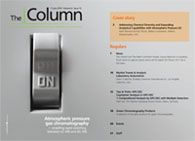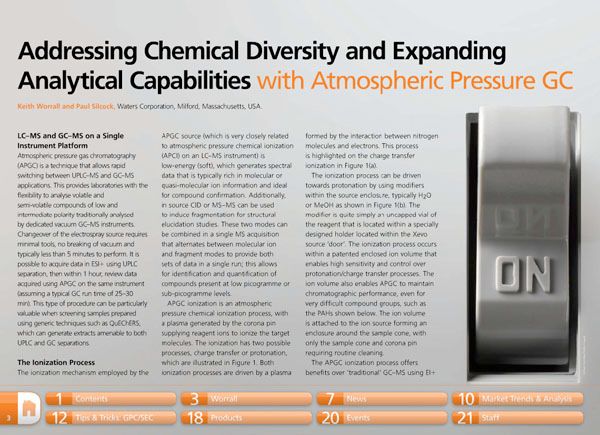Addressing Chemical Diversity and Expanding Analytical Capabilities with Atmospheric Pressure GC
Atmospheric pressure gas chromatography is a technique that allows rapid switching between UPLC-MS and GC-MS applications.
Atmospheric pressure gas chromatography (APGC) is a technique that allows rapid switching between UPLC-MS and GC-MS applications. This provides laboratories with the flexibility to analyse volatile and semi-volatile compounds of low and intermediate polarity traditionally analysed by dedicated vacuum GC-MS instruments. Changeover of the electrospray source requires minimal tools, no breaking of vacuum and typically less than 5 minutes to perform. It is possible to acquire data in ESI+ using UPLC separation, then within 1 hour, review data acquired using APGC on the same instrument (assuming a typical GC run time of 25-30 min). This type of procedure can be particularly valuable when screening samples prepared using generic techniques such as QuEChERS, which can generate extracts amenable to both UPLC and GC separations.

University of Rouen-Normandy Scientists Explore Eco-Friendly Sampling Approach for GC-HRMS
April 17th 2025Root exudates—substances secreted by living plant roots—are challenging to sample, as they are typically extracted using artificial devices and can vary widely in both quantity and composition across plant species.
Sorbonne Researchers Develop Miniaturized GC Detector for VOC Analysis
April 16th 2025A team of scientists from the Paris university developed and optimized MAVERIC, a miniaturized and autonomous gas chromatography (GC) system coupled to a nano-gravimetric detector (NGD) based on a NEMS (nano-electromechanical-system) resonator.
Miniaturized GC–MS Method for BVOC Analysis of Spanish Trees
April 16th 2025University of Valladolid scientists used a miniaturized method for analyzing biogenic volatile organic compounds (BVOCs) emitted by tree species, using headspace solid-phase microextraction coupled with gas chromatography and quadrupole time-of-flight mass spectrometry (HS-SPME-GC–QTOF-MS) has been developed.












